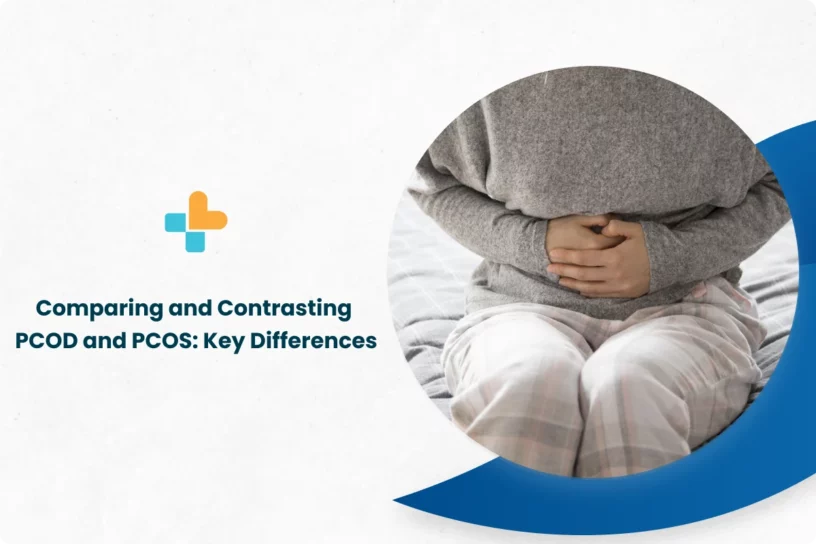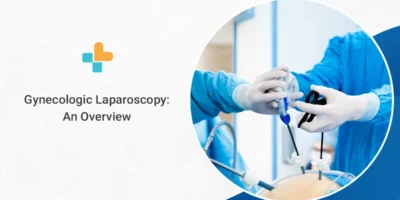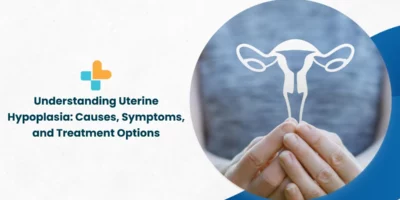What is PCOS?
Polycystic ovary syndrome (PCOS) is a hormonal disorder that affects women of reproductive age. It is characterised by the presence of multiple cysts on the ovaries, which can cause a variety of symptoms including irregular periods, acne, and excessive hair growth. PCOS is also associated with a higher risk of developing diabetes, high blood pressure, and heart disease.
What is PCOD?
Polycystic ovary disease (PCOD) is a condition that is characterised by the presence of multiple cysts on the ovaries. It is often used interchangeably with PCOS, but the two conditions are not exactly the same. PCOD is a symptom of an underlying hormonal imbalance, whereas PCOS is a specific diagnosis.
What are some common signs & symptoms of PCOD and PCOS?
Common signs and symptoms of PCOS and PCOD include irregular menstrual periods, acne, excessive hair growth on the face and body, weight gain, and difficulty getting pregnant.
Causes of PCOS
The exact cause of PCOS is not known, but it is believed to be related to a hormonal imbalance. Women with PCOS have higher levels of androgens (male hormones) and insulin resistance, which can lead to the formation of cysts in the ovaries. Other risk factors for PCOS include obesity, a family history of the condition, and certain genetic disorders.
Causes of PCOD
The cause of PCOD is not entirely understood, but it is believed to be related to an imbalance of hormones, specifically androgens. PCOD is also associated with obesity and insulin resistance, which can further exacerbate the hormonal imbalance. Genetic factors may also play a role in the development of PCOD
Difference between PCOD and PCOS
The table below summarises the key differences between PCOD and PCOS:
PCOD Vs PCOS
| PCOD | PCOS |
|---|---|
| PCOD is characterised by the presence of multiple cysts on the ovaries and an imbalance in hormones, precisely an excess of androgens and a lack of estrogen. | PCOS is a specific diagnosis of a hormonal disorder characterised by the presence of multiple cysts on the ovaries, an imbalance in hormones, precisely an excess of androgens and a lack of estrogen, and a higher risk of diabetes and heart disease. |
| PCOD is a symptom of an underlying hormonal imbalance. | PCOS is a specific diagnosis of a hormonal disorder. |
| PCOD is not associated with a higher risk of diabetes and heart disease. | PCOS is associated with a higher risk of diabetes and heart disease. |
Complications of PCOS / PCOD problem
If left untreated, PCOS and PCOD can lead to several complications, including:
- Infertility
- Metabolic disorders
- Endometrial cancer
- Depression and anxiety
Diagnosis of PCOD & PCOS
PCOS and PCOD are diagnosed based on a combination of physical examination, medical history, and laboratory tests. A pelvic exam may be performed to check for the presence of cysts on the ovaries, and blood tests may be done to measure hormone levels and check for diabetes and other conditions. Ultrasound imaging may also be used to confirm the diagnosis.
Natural home remedies for PCOD / PCOS
Several natural remedies may help alleviate symptoms of PCOS and PCOD. These include:
- Maintaining a healthy diet and exercise regimen: Eating a diet low in processed foods and high in fruits, vegetables, and whole grains can help reduce symptoms of PCOS and PCOD. Regular exercise, such as brisk walking, can also help reduce symptoms.
- Reducing stress: Stress can exacerbate symptoms of PCOS and PCOD, so it’s important to find ways to manage stress. Yoga, meditation, and other stress management techniques can be helpful.
- Taking supplements: Certain supplements, such as omega-3 fatty acids, vitamin D, and magnesium, may help reduce symptoms of PCOS and PCOD.
- Herbal remedies: Herbs such as chaste berry, saw palmetto, and spearmint tea may help alleviate symptoms of PCOS and PCOD.
What is the best possible treatment for PCOD & PCOS?
The best treatment for PCOS and PCOD will depend on the specific symptoms and complications. Some common treatments include:
Birth control pills: Birth control pills can help regulate menstrual cycles and reduce symptoms of PCOS and PCOD such as acne, hirsutism (excess hair growth), and irregular periods.
Metformin: Metformin is a medication that can help improve insulin sensitivity and reduce symptoms of PCOS and PCOD. It can also help with weight loss and enhance the ovulation rate.
Clomiphene: Clomiphene is a medication that can help stimulate ovulation in women with PCOS and PCOD.
Surgery: In some cases, surgery such as ovarian drilling may be necessary to remove cysts or ovarian tissue.
Lifestyle changes: It is important to maintain a healthy diet and exercise regimen to help reduce symptoms and complications of PCOS and PCOD.
It’s important to work with a healthcare provider to determine the best course of treatment for your individual needs.
FAQs
Q: Can PCOS and PCOD be cured?
A: PCOS and PCOD are chronic conditions, so there is no cure. However, symptoms can be managed with treatment and lifestyle changes.
Q: PCOD or PCOS which is more dangerous?
Both PCOS and PCOD are serious conditions that can have significant health implications if left untreated. However, PCOS is considered to be a more serious condition than PCOD because it is associated with a higher risk of long-term health complications such as metabolic disorders, type 2 diabetes, cardiovascular disease, and endometrial cancer.
Are you looking for good gynecologists to consult? Contact us at 636-610-0800 to know more.
Our Hospital Locations
Gynaecology Surgery Hospitals in Chandigarh | Gynaecology Surgery Hospitals in Bangalore | Gynaecology Surgery Hospitals in Jaipur | Gynaecology Surgery Hospitals in NCR | Gynaecology Surgery Hospitals in Hyderabad
Our Doctors
Gynaecology Surgery Doctors in Chandigarh | Gynaecology Surgery Doctors in Bangalore | Gynaecology Surgery Doctors in Jaipur | Gynaecology Surgery Doctors in NCR | Gynaecology Surgery Doctors in Hyderabad
About the Author

Dr. S. Goel
Dr. S. Goel is a renowned Internal Medicine Specialist currently practicing at Ayu Health, Bangalore. He is a Specialist in Internal Medicine, Diabetes HTN, Paediatric Care, and Family Medicine.




